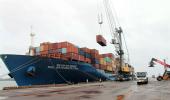Any government support or incentive to help exporters deal with high freight and insurance costs is unlikely.

Top officials at the prime minister's office are reviewing the developments related to the troubled Red Sea region and its impact on trade and logistics, people aware of the matter said.
Senior commerce department officials met PMO officials, although any government support or incentive to help exporters deal with high freight and insurance costs is unlikely.
Last week, Commerce Secretary Sunil Barthwal held hectic meetings with officials of his department and also chaired an inter-ministerial meeting, along with officials of the ministries of defence and external affairs, and the department of financial services.
Iran-backed Houthi rebels of Yemen have been repeatedly attacking ships in the Red Sea, and this has forced commercial vessels to take a longer route to avoid the troubled region.
This has resulted in higher freight costs because taking the route via the Cape of Good Hope, discovered by the Portuguese in the 15th century, has increased the transit time by around 20 days.
Insurance premiums too have risen. The finance ministry said prices might go up because of higher energy costs caused by the rise in shipping charges.
The Red Sea is vital for 30 per cent of global container traffic and 12 per cent of global trade. As much as 80 per cent of India's merchandise trade with Europe passes through it.
A senior government official said as of now there had been no impact in terms of volumes (of shipments).
"The only thing is freight costs have risen, but it is the same in other countries as well, such as Vietnam and Indonesia," a senior government official told Business Standard.
The official said the impact of the disruption was not seen in December's trade data, but the government was collating and closely looking into the current month's impact on export and import.
According to CRISIL Ratings, the Red Sea crisis will have a differential impact across sectors.
Players operating in areas such as agricultural commodities and marine foods could see a significant impact due to the perishable nature of their goods and/or lean margin profiles, which limit their ability to absorb the risks from rising freight cost.
On the other hand, players in textiles, chemicals and capital goods may not be immediately affected. This will be because of better ability to pass on higher costs or as a result of a weaker trade cycle, the ratings agency said.
As far as industry support is concerned, many governments, including India's, are taking precautionary measures to safeguard a free flow of vessels and to protect them from these activities.
However, any incentive or support may not be in the offing.
"We want our exporters to be resilient and face the world's challenges and by and large we have been successful in that," Commerce and Industry Minister Piyush Goyal had told Business Standard.
During the first inter-ministerial meeting on the Red Sea issue in January, the commerce department and the finance ministry discussed maintaining the credit flow to Indian exporters.
The government has also asked Export Credit Guarantee Corporation not to raise insurance rates.
Feature Presentation: Ashish Narsale/Rediff.com











